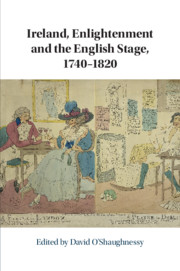Book contents
- Ireland, Enlightenment and the English Stage, 1740–1820
- Ireland, Enlightenment and the English Stage, 1740–1820
- Copyright page
- Contents
- Illustrations
- Tables
- Contributors
- Acknowledgements
- Introduction Staging an Irish Enlightenment
- Part I Representations and Resistance
- Part II Symbiotic Stages: Dublin and London
- Chapter 4 Midas, Kane O’Hara and the Italians: An Interplay of Comedy between London and Dublin
- Chapter 5 Trading Loyalties: Sheridan, The School for Scandal and the Irish Propositions
- Chapter 6 Sydney Owenson, Alicia Sheridan Le Fanu and the Domestic Stage of Post-Union Politics
- Part III Enlightened Perspectives
- Select Bibliography
- Index
Chapter 5 - Trading Loyalties: Sheridan, The School for Scandal and the Irish Propositions
from Part II - Symbiotic Stages: Dublin and London
Published online by Cambridge University Press: 22 July 2019
- Ireland, Enlightenment and the English Stage, 1740–1820
- Ireland, Enlightenment and the English Stage, 1740–1820
- Copyright page
- Contents
- Illustrations
- Tables
- Contributors
- Acknowledgements
- Introduction Staging an Irish Enlightenment
- Part I Representations and Resistance
- Part II Symbiotic Stages: Dublin and London
- Chapter 4 Midas, Kane O’Hara and the Italians: An Interplay of Comedy between London and Dublin
- Chapter 5 Trading Loyalties: Sheridan, The School for Scandal and the Irish Propositions
- Chapter 6 Sydney Owenson, Alicia Sheridan Le Fanu and the Domestic Stage of Post-Union Politics
- Part III Enlightened Perspectives
- Select Bibliography
- Index
Summary
Richard Brinsley Sheridan, playwright and theatre owner, was elected an MP for Stafford in 1780, promising to represent his constituents. In making this pledge, Sheridan was claiming the persona of an English parliamentarian. Yet Sheridan probably considered himself as at least partly Irish and knew that he was working within the contradictions and of the Irish diaspora. This chapter re-examines Sheridan’s comedies, suggesting ways in which the mutability of personality central to The School for Scandal can be read in terms of Sheridan’s own multiple loyalties. Identity is never merely a matter of playful slippage. Cultural and political realities demand singular commitments. A test came for Sheridan in 1785 when William Pitt presented his Irish propositions, seeking to regulate trade with Ireland. The proposals prompted protest in the English regions, notably the manufacturing districts, including Staffordshire. To appease his opponents Pitt altered his scheme in ways injurious to Ireland. The evolution of this debate placed unique pressure on the Irish-born member for Stafford. By examining Sheridan’s leading role in these debates, it is possible to come to a new understanding, not only of Sheridan’s predicament but also of how The School for Scandal evolved in a period of crisis.
Keywords
- Type
- Chapter
- Information
- Ireland, Enlightenment and the English Stage, 1740-1820 , pp. 128 - 145Publisher: Cambridge University PressPrint publication year: 2019



